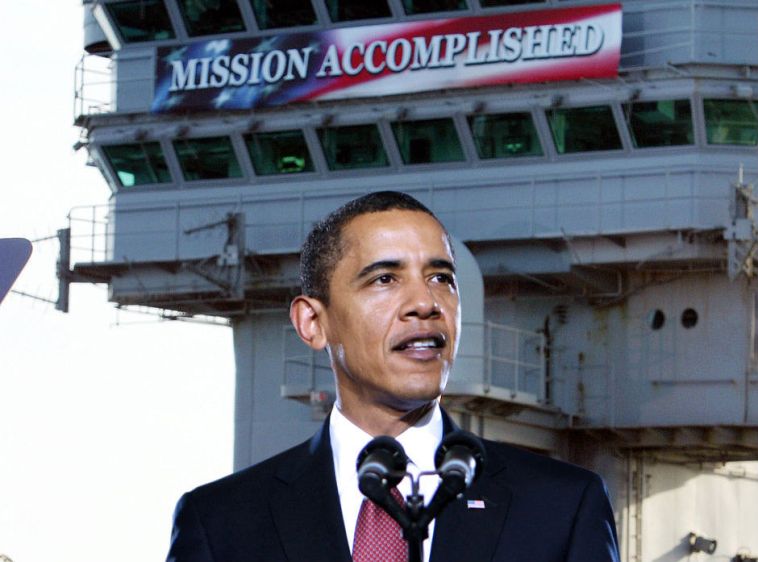What do the latest Obamacare enrollment figures have to do with purple fingers? Liberal pundit and policy wonk Ezra Klein can explain.
Videos By Rare
“Obamacare has won,” Klein proclaimed on the website of his new journalism venture. “And that’s why Secretary of Health and Human Services Kathleen Sebelius can resign.”
After conservatives mostly laughed off this assertion, Klein doubled down on his claim with a post titled “The right can’t admit that Obamacare is working.”
“I want the truth!” Lt. Kaffee, played by Tom Cruise, demands in the film “A Few Good Men.” Col. Jessep, portrayed by Jack Nicholson, replies, “You can’t handle the truth!”
Klein even likened the right’s rejection of Obamacare to what the columnist Charles Krauthammer called Bush Derangement Syndrome: “the acute onset of paranoia in otherwise normal people in reaction to the policies, the presidency—nay—the very existence of George W. Bush.”
Yet there may be other more applicable lessons from the Bush years to ponder. In early 2005, the percentage of Americans telling Gallup the Iraq war was a mistake outnumbered those who thought it wasn’t a mistake for the first time.
Even as Bush was reelected the previous November, with exit polls showing the electorate still narrowly in agreement with the decision to go to war, three times as many thought things in Iraq were going “very badly” as “very well.” The shock and awe that toppled Saddam Hussein had given way to a costly and violent occupation.
The Iraqi elections were held at the end of January 2005. Critics of the war, as well as many neutral observers, were pessimistic. Turnout was expected to be low, because of the violence. Neighborhoods were regularly hit by a hail of gunfire and mortar shells. It was certainly a much worse experience than receiving a 404 error while trying to access HealthCare.gov.
But turnout exceeded expectations. The enduring image was jubilant Iraqis with purple fingers signifying they had voted in the elections. “Democracy won in a landslide Sunday here in Sadr City, the epicenter of Iraqi politics,” read an op-ed in the New York Times, hardly a pro-Bush outlet, the next day.
To supporters of the Iraq war, it was not just a successful election. It was the first time they had seemed right and their critics wrong since the statue of Saddam came down in Firdos Square. To them, the entire project from the invasion to the attempted democratization of Iraq stood vindicated.
Premature proclamations of victory in Iraq were common, from George W. Bush’s “Mission Accomplished” speech aboard the USS Abraham Lincoln in 2003 to John McCain’s assertions of the same during the 2008 presidential campaign. They were never more ubiquitous than after those elections or the surge, which also exceeded war opponents’ expectations.
But the percentage of Americans who see the Iraq war as a mistake, according to Gallup, never dipped below 50 percent again after September 2006. Even that poll may have been an outlier, since the war was viewed as a mistake by a 56 percent to 40 percent margin in the October survey.
Al Qaeda today has a larger profile in Iraq than before the invasion. Iran is more powerful. The death toll is once again rising and the only answer war supporters have is that the U.S. troops should have stayed longer—even though they left essentially at the Iraqis’ behest.
In fact, the political party that won the purple finger election listed as its number two campaign promise “setting a timetable for the withdrawal of multinational forces from Iraq.” That hopeful New York Times piece continued, “When the Iraqi government tells the Americans to leave, they will not be able to stay. Whether a little too soon or a little too late, this is the way it is supposed to be.”
Liberals don’t like comparisons between Obamacare and the Iraq war, perhaps because many of them—Vice President Joe Biden, 2016 Democratic frontrunner Hillary Clinton, Senate Majority Leader Harry Reid, Sen. Chuck Schumer and, many rungs down the ladder, Ezra Klein—once thought the war was a good idea too.
And it’s indisputably true that even a flawed or sub-optimally functioning government health care program will help some people who need it, while even a necessary and just war that ends in victory risks some innocent lives.
The United States has both won wars and built social programs that have lasted for decades, so failure is hardly inevitable.
But the imperfections of the analogy shouldn’t keep one party’s best and brightest from learning from the mistakes of another. Obamacare’s problems with cost and access haven’t gone away any more than the difficulties of nation-building in unfamiliar lands. In both cases, it takes more than the confident assurances of technocrats and partisans to make them go away.
Too often, it’s easier to dismiss doubters as suffering from some kind of derangement syndrome. And it is always possible to argue that action is preferable to people living under Saddam’s tyranny or without health insurance.
Jeremy Lott dubbed Sebelius “Obama’s Rumsfeld,” which may or may not be true. Perhaps Obamacare enrollees will greet her as a liberator. But Rumsfeld was right about one thing: central planners are frequently tripped up by what they don’t know, from the known unknowns to the unknown.

